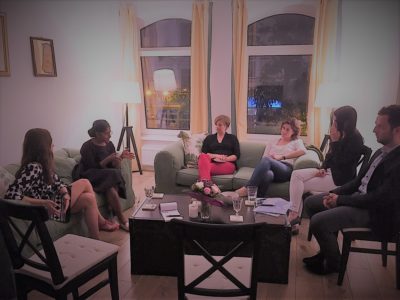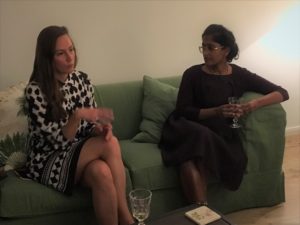
For 70 years, NATO has helped protect Europe. Article 5, the alliance’s commitment to common defence, is still the most important insurance against possible aggression from the outside. Yet two key allies are sowing doubt about NATO’s cohesion and reliability – US President Donald Trump who has declared the organisation “obsolete”, and Turkey’s President Recep Tayyip Erdogan who is embracing increasingly authoritarian and anti-Western policies.
Against this backdrop, what should Europe do about defence? On August 23, 2017, a group of United Europe alumni and friends gathered in Frankfurt to discuss “Who Needs NATO.” Therese von Liechtenstein and Claudia Schmidt, who organised the meeting, also provided initial input.
Therese argued pro-NATO, pointing to the dangers surrounding Europe from an increasingly aggressive Russia to the instability and Islamic radicalism of large parts of North Africa and the Middle East. Europe, she said, simply did not have the military competence to deal with an aggression. As far as it had developed military capabilities, they were focussed on interventions abroad. Therefore, NATO was still needed to provide an effective deterrence.
Claudia, in contrast, made the case for a more independent European defence policy. NATO, she reminded participants, had been founded to defend Western values against the Soviet Union. Given the positions of Trump and Erdogan, those values clearly weren’t relevant to all the NATO countries anymore. Europe, Claudia concluded, needed to build up its defence very quickly to be able to face possibly hostile nations on its own.
A lively controversy ensued which also benefited from the contributions of two participants with Turkish roots who spoke about the feeling of estrangement between Turkey and the West. At the same time, they added, they believed NATO was particularly important for Turkey, not just because it provides a common framework, but also because of Turkey exposure to an unstable and dangerous neighbourhood.

How to conclude? Europe, all the alumni agreed in the end, must build up its own defence. Yet this will take both time and commitment. In the meantime, Europeans must be careful not to damage NATO as their most effective means of deterrence and defence. Ideally, a stronger European defence would even lead to increase Europe’s influence within NATO and vis-à-vis the United States.
Clearly, the alumni concluded, more needs to be done to convince the European public – which, particularly in Germany, is quite sceptical towards military matters – that more efforts are needed to bolster defence. Yet to start this debate during the German election campaign would be counterproductive. 2018 promises to be an interesting year for Europe.


